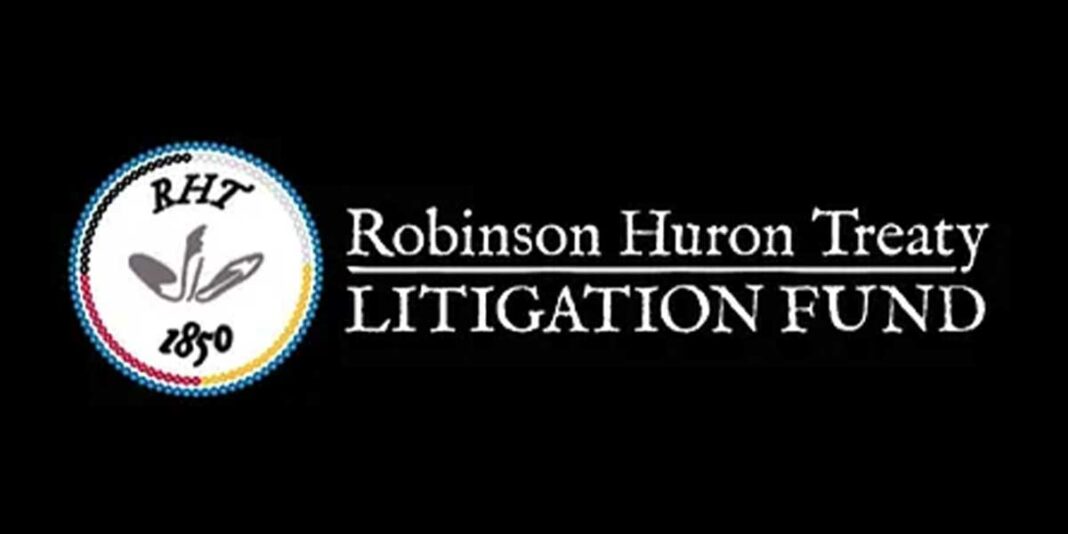ROBINSON-HURON—The beneficiaries and 21 First Nations (including all of those on Manitoulin Island) of the multi-million-dollar treaty annuities settlement and distribution for past compensation may be delayed due to outstanding legal matters that are to take place in Superior Court.
The Robinson Huron Treaty Litigation Fund (RHTLF), in a notice last Friday, July 12, warned that two court applications will require lawyers’ fees to be taken out of the historic $10-billion settlement, and the distribution of settlement monies to the First Nations may be delayed due to the court hearing, scheduled for July 30.
“The lawyers’ fees will be paid from the $10 billion settlement for past annuities owed to beneficiaries of the Robinson Huron Treaty,” the notice reads. “This means that all fees paid to the lawyers are coming out of funds for beneficiaries, which may affect you and your First Nation. The first step in the assessment application asks the court to decide whether to assess the lawyers’ fees.”
“Atikmeksheng Anishinabek and Garden River First Nation have commenced a court application against the lawyers for the RHTLF. The application says that the lawyers’ fees were too high and it asks the court to reduce them.”
The Litigation Management Committee of the RHTLF has also commenced a court application. The application asks about the legal status of the settlement money held by the RHTLF fund. The aim is to determine what steps should be taken before distributing the money to beneficiaries.”
A June 7 application had been filed in Ontario Superior Court on behalf of Garden River First Nation and Atikameksheng Anishnawbek First Nations asking that the $510 million in legal fees paid out to Nahwegahbow Corbiere Genoodmagejig Barristers and Solicitors for its work on the annuities claim be held in trust while the dollar amount is reassessed in the courtroom.
On April 12, 2024, the trustees of the RHTLF approved $510 million in legal fees to its lawyers. The lawyers agreed to keep $255 million and give $255 million to certain causes associated with the Robinson Huron Treaty First Nations. It is unclear at this point what those causes are.
Additionally, there is a question about whether the remaining settlement funds are assets of the RHTLF, which could mean that additional steps are required before they can be distributed to beneficiaries. The court is being asked to provide direction to the trustees on this point.
Settlement funds had been anticipated to flow into all 21 First Nations in August.
As has been reported previously the settlement provides past compensation to Robinson Huron Treaty beneficiaries who have not seen an increase to annual treaty payments for 150 years, as dollars and funds were generated in the territory to the Crown, through resource revenues from the mining, forestry and fishing sectors continuing to increase.
Annual treaty payments to Anishinaabe beneficiaries, (known as annuities), have remained at the same $4 per person since 1875. Before that time, the annuities were equivalent to $1.60 per person.
The Ontario Superior Court of Justice ruled in 2018, the Crown had an obligation under a clause in the 1850 treaty to increase the annuities as the monies generated for the land increased over time, so long as the Crown can do this without incurring a loss.
A $10 billion settlement was announced in 2023, with Canada and Ontario paying out $5 billion each, despite the province proceeding with an appeal of previous court decisions during the annuities claim.
A court hearing is scheduled for July 30 at 10 am, the RHTLF notice reads. All beneficiaries of the Robinson Huron Treaty are welcome to watch the hearing, either in person or by videoconference. The courthouse is located on the eighth floor of 330 University Avenue in Toronto. A link to the videoconference will be made available on the RHTLF website and Facebook page closer to the date of the hearing.




